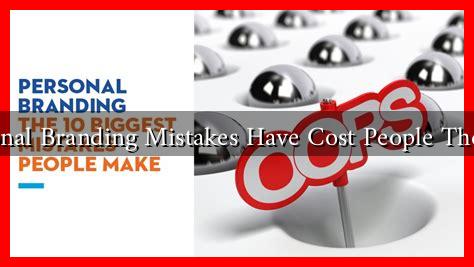-
Table of Contents
What Personal Branding Mistakes Have Cost People Their Careers?
In today’s digital age, personal branding has become a crucial aspect of career development. A strong personal brand can open doors to new opportunities, while a poorly managed one can lead to career setbacks or even job loss. This article explores common personal branding mistakes that have cost individuals their careers, providing insights and examples to help you avoid these pitfalls.
The Importance of Personal Branding
Personal branding is the practice of marketing oneself and one’s career as a brand. It encompasses how you present yourself online and offline, including your social media presence, professional interactions, and even your resume. According to a study by CareerBuilder, 70% of employers use social media to screen candidates during the hiring process. This statistic underscores the importance of maintaining a positive personal brand.
Common Personal Branding Mistakes
Here are some of the most significant personal branding mistakes that have cost individuals their careers:
- Inconsistent Online Presence: Having different profiles across various platforms can confuse potential employers. For instance, if your LinkedIn profile showcases professionalism while your Twitter account features inappropriate jokes, it sends mixed signals.
- Neglecting Social Media: Failing to engage with your audience on social media can make you seem out of touch. A lack of activity can lead to missed networking opportunities and a diminished online presence.
- Posting Controversial Content: Sharing polarizing opinions or inappropriate content can alienate potential employers. For example, a marketing executive lost their job after posting offensive comments on social media, which were discovered during a routine background check.
- Over-Promoting Yourself: While self-promotion is essential, excessive bragging can come off as arrogant. A balance must be struck between showcasing achievements and remaining humble.
- Ignoring Feedback: Constructive criticism is vital for personal growth. Ignoring feedback from peers or mentors can hinder your professional development and damage your brand.
Case Studies of Personal Branding Failures
Several high-profile cases illustrate the consequences of poor personal branding:
- Justine Sacco: In 2013, Sacco, a PR executive, tweeted a controversial joke before boarding a flight to South Africa. By the time she landed, her tweet had gone viral, leading to her termination. This incident highlights the dangers of impulsive social media use.
- James Damore: The former Google engineer was fired after writing a memo criticizing the company’s diversity policies. His case sparked a national debate on free speech and workplace culture, but it ultimately cost him his job and damaged his reputation.
Statistics on Personal Branding
Understanding the impact of personal branding can be illustrated through various statistics:
- According to a survey by LinkedIn, 85% of jobs are filled through networking.
- Research from the Harvard Business Review indicates that 60% of hiring managers have rejected candidates based on their social media profiles.
- A study by CareerBuilder found that 54% of employers have decided not to hire a candidate due to their social media activity.
How to Build a Strong Personal Brand
To avoid the pitfalls of poor personal branding, consider the following strategies:
- Be Authentic: Authenticity resonates with audiences. Share your true self, including your values and passions.
- Maintain Consistency: Ensure that your online profiles reflect a cohesive image. Use the same professional photo and bio across platforms.
- Engage with Your Audience: Regularly interact with your followers and peers. Share valuable content and respond to comments to build relationships.
- Monitor Your Online Presence: Regularly check what others see when they search for you online. Use tools like Google Alerts to stay informed about your digital footprint.
Conclusion
Personal branding is a powerful tool that can significantly impact your career trajectory. By avoiding common mistakes such as inconsistent online presence, neglecting social media, and posting controversial content, you can build a strong personal brand that opens doors rather than closes them. Remember, your personal brand is not just about how you see yourself; it’s also about how others perceive you. Take control of your narrative, engage authentically, and watch your career flourish.
For more insights on personal branding, consider visiting Forbes.

